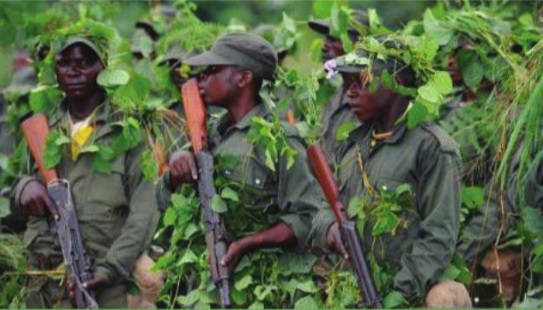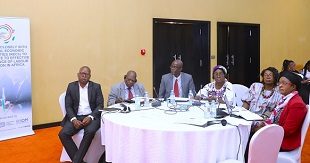
Is FDLR splitting?
The recent arrest of a top Rwandan rebel commander in the DR Congo has once again sparked speculation that the FDLR could be on the verge of imploding internally.
Habyarimana Mucebo Sofuni, a senior member of the Rwandan FDLR rebel group, was captured in Rutshuru, north-eastern DR Congo on Oct. 27.
The Congolese Army announced Oct.29 that it had arrested Col. Mucebo, one of the senior commanders of the rebel outfit accused of orchestrating massacres in the 1994 genocide against the Tutsi.
He is also wanted by the Kinshasa government to face justice over atrocities he is alleged to have committed on Congolese soil.
Mucebo, who has been the FDLR intelligence chief, is among FDLR members who fled into the DR Congo after the 1994 genocide in Rwanda.
Many of them are suspected to have participated in the slaughter of some 800,000 ethnic Tutsis and moderate Hutus and many are on Rwanda’s wanted list.
Macebo’s arrest follows on the heels of the arrest of another top FDLR officer, Maj. Sabimana Iraguha, alias Mugisha Vainqueur, a commander of the FDLR’s military wing, the Forces Combattantes Abacunguzi (FOCA). He was captured on Aug.11 at Katiru, also in the Rutshuru territory of North Kivu Province. He was shown to journalists in the provincial capital, Goma.
Before that in May, another FDLR officer, Gen. Leopold Mujyambere was arrested. He was the FDLR chief of staff at the time of his arrest. All of them are languishing in jails in Kinshasa.
Most are on the wanted list of the Kinshasa government over atrocities the rebel group has allegedly committed in DR Congo’s North Kivu province where it has been based.
There was wide speculation that Mujyambere could not have been arrested without collusion of disenchanted officers within the FDLR. He was arrested in Goma by operatives of the Congolese intelligence service after his return from southern Africa.
It is speculated that the FDLR command is divided between loyalty to one General Sylvestre Mudacumura, who is the overall FDLR commander, and those more loyal to General Victor Byiringiro, the acting president of the group.
It is said that pressure on the military front has exacerbated internal tensions within the group.
A widely quoted commentator on the FDLR is Jason Stearns, the director of the Congo Research Group at New York University. He said in a blog comment that has been reported many times that the capture of Mujyambere could point to divisions between the FDLR’s military and political wings.
“While the (Congolese) operations have had little impact on the group’s command structure … this military pressure has exacerbated internal tensions within the group which are difficult to parse but seem to be serious,” he wrote.
The FDLR remains the biggest armed group in the eastern Congo. But it has recently suffered major casualties it its battle with the UN forces and the Congolese government. Some estimates say its strength has been cut from around 6,000 ten years ago to about 1,500 to 2,500 today.
The hemorrhage on FDLR is a result of years of pounding by the Congolese army as part of its Operations Sokola II. One report says that while the operations have had little impact on the group’s command structure, they did manage to dislodge the rebels from their headquarters around Buleusa and Ihula in Lubero/Walikale territories (the offensive also employed local ethnic militia, which has in turned fanned the flames of local ethnic conflict between the Nande and the Hutu communities).
At the time of his arrest, Mujyambere was the most important FDLR commander ever arrested by the Congolese and the Kinshasa government made a meal out of it.
It is said the Mujyambere was close to Mudacumura and was sold out by forces loyal to Byiringiro. He was arrested during a routine police stop in Goma after a security services operative pointed him out.
Reports from that period claimed a similar fate befell another senior FDLR officer, who was earlier arrested in Tanzania.
The FDLR, as expected, insists that it is not divided and that the claims are a propaganda ploy by their enemies, the UN forces and Congolese government to drive a wedge between the FDLR command structures.
The Rwanda government has for a long time been concerned about the existence on its western border of the FDLR which comprises remnants of the former Rwanda Armed Forces (ex-FAR) and Interahamwe militia, both of whom are blamed for the 1994 Genocide against the Tutsi.
But the DR Congo President Joseph Kabila and his Rwandan counterpart, Paul Kagame, appear to be mending their once sour relationship.
At a meeting in August, Kabila is said to have promised Kigali that he would deal decisively with the FDLR.
The two presidents in August agreed that the two countries will work together to improve economic and security ties.
Following his meetings with President Kagame and Uganda’s President Yoweri Museveni, observers say the Congolese President is looking to win the support of his neighbours to the west. Kabila is facing stiff resistance from the masses after postponing presidential polls, with a plan to stay in office until 2018 and needs all allies he can muster.
The arrest of Mucebo is being hailed as a sign that Kabila is living up to his promise. One report quoted Rwandan Minister of Justice Johnston Busingye calling for Mucebo to be deported to Rwanda to face trial and that Kigali had called it a “Positive development”.
 The Independent Uganda: You get the Truth we Pay the Price
The Independent Uganda: You get the Truth we Pay the Price


